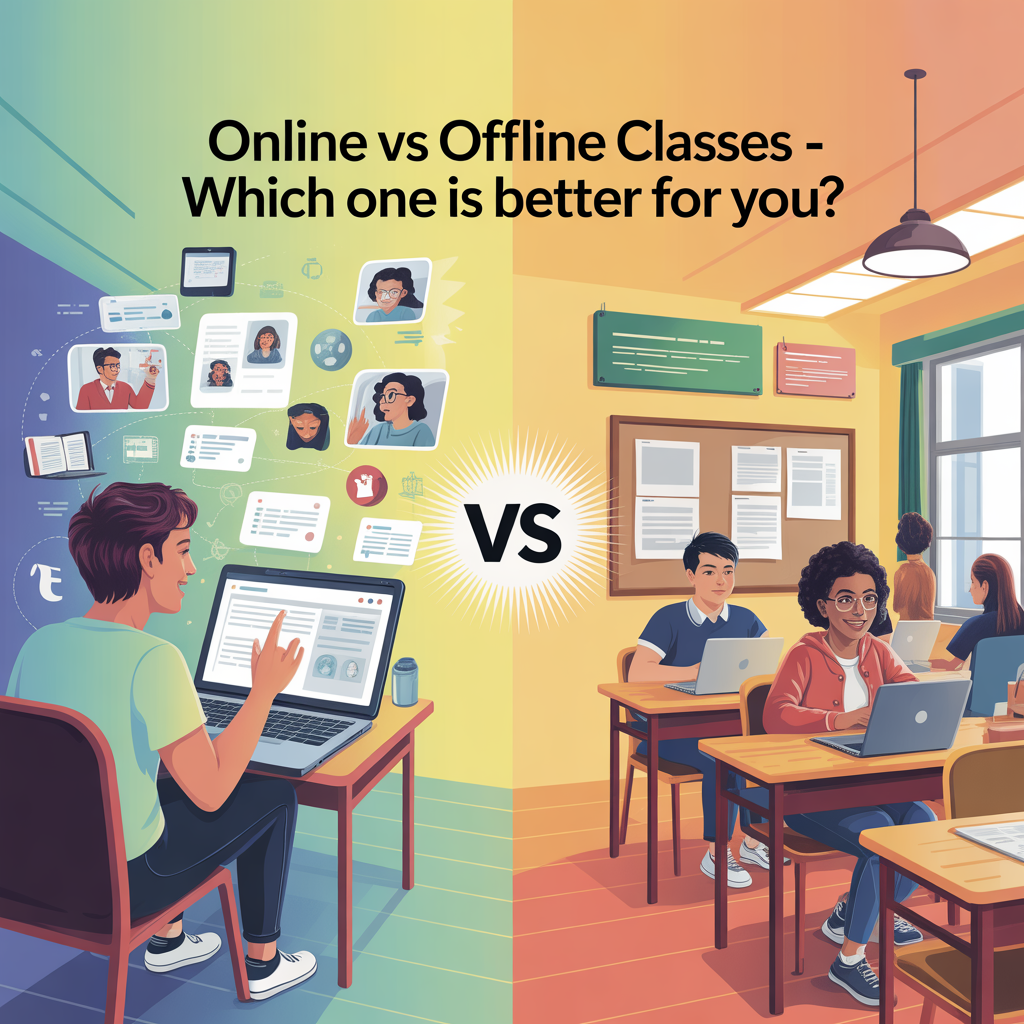In today’s fast-changing education system, students and parents are often confused between online classes and offline classes. With the rise of digital learning platforms and remote education, the debate between online and offline learning has become more relevant than ever.
So, which one is better for you? In this blog, we’ll explore the benefits, limitations, and differences between online and offline classes to help you decide the best learning method based on your goals, lifestyle, and preferences.
What Are Online Classes?
SEO Keyword: Benefits of online classes
Online classes are conducted through the internet using laptops, tablets, or smartphones. Students attend live or recorded sessions, complete assignments online, and interact with teachers through video calls or discussion forums.
Advantages of Online Classes:
- Flexibility in timing and location
- Access to recorded lessons anytime
- Cost-effective and time-saving
- Wide variety of courses and subjects
- Learn at your own pace
What Are Offline Classes?
SEO Keyword: Advantages of offline learning
Offline classes are traditional classroom sessions where students and teachers interact face-to-face. This method is followed in schools, colleges, coaching centers, and universities.
Advantages of Offline Classes:
- Direct interaction with teachers and classmates
- More discipline and structured routine
- Better focus with fewer distractions
- Group activities and hands-on learning
- Strong academic and social environment
Online vs Offline Classes – Key Differences
| Feature | Online Classes | Offline Classes |
|---|---|---|
| Learning Style | Self-paced and digital | Classroom-based and structured |
| Interaction | Virtual, limited real-time | Face-to-face with real-time feedback |
| Flexibility | High – learn from anywhere | Low – fixed schedule and location |
| Cost | Often lower or free | Can be expensive (fees, travel) |
| Technology Use | Requires internet and devices | Minimal use of technology |
| Discipline | Self-discipline needed | Teacher-led discipline |
Which One Is Better for You?
SEO Keyword: Online vs offline education comparison
The choice between online and offline classes depends on your learning goals, personal style, and daily routine. Here’s how to decide:
Choose Online Classes if:
- You need flexibility due to work or other commitments
- You prefer self-study and digital resources
- You live in a remote area with limited access to quality institutes
- You want to learn new skills or certifications at your own pace
- You are comfortable with using technology
Choose Offline Classes if:
- You learn better through face-to-face interaction
- You need regular motivation and teacher guidance
- You value classroom discussions and practical activities
- You’re preparing for school exams or competitive exams
- You find it hard to stay focused at home
A Blended Approach – The Best of Both Worlds
SEO Keyword: Blended learning benefits
Many students today are choosing a blended learning model, which combines online study with offline support. For example, students attend live online classes during the week and meet tutors in person on weekends.
Blended learning offers flexibility along with personal attention, helping students achieve better results.
Final Thoughts
Both online and offline classes have their strengths. The key is to choose the method that suits your learning style, schedule, and career goals. While online classes offer convenience and access to global content, offline classes provide structure, discipline, and deeper engagement.
Remember, learning is effective only when you are consistent, motivated, and clear about your goals — no matter which mode you choose.
Frequently Searched Keywords
- Online vs offline classes
- Which is better online or offline learning
- Difference between online and offline education
- Benefits of online learning for students
- Advantages of traditional classroom teaching
- Best mode of learning in 2025

